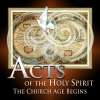
Sunday, October 02, 2011
by Robert Dean
Passage: Colossians 1:25-29
Series: Colossians (2011)
Duration: 50 mins 53 secs
As we conclude the last verses in chapter one of our Colossians series, Paul introduces the Mystery Doctrine to us. As the designated apostle to the Gentiles, his role is actually part of this Mystery Doctrine and gives him the distinction of explaining the privileges of the Church age believer and how that differs from the barrier between Jew and Gentile that existed in the Old Testament. He talks about the "mystery of Christ", the "riches of the glory of this mystery", and "Christ in you, the hope of glory." What is meant by all these terms? As we will discover, the Mystery Doctrine includes Jesus Christ's presence among the Gentiles for the first time.

Tuesday, October 02, 2012
by Robert Dean
Passage: Acts 9:19-22
Series: Acts (2010)
Duration: 1 hr 7 mins 32 secs
The conversion of Saul on the road to Damascus is the historical account of an event that had enormous consequences for the Church. Paul’s entourage witnessed this event on their way to round up and persecute believing Jews. Saul was blinded, emotionally stunned, and intellectually challenged. Intense prayer and fasting were the result of Saul’s narrowed focus on the ramifications of this event. After strengthening with food, Saul immediately preached Christ in the synagogues. What does it mean to “preach Christ?” What is the difference between preaching and teaching? What was the response? What are the parallels in Paul’s message and the first message of Jesus when He taught in Nazareth? What is the importance of our physical and spiritual strengthening to the message the Church carries to the world?

Tuesday, January 29, 2013
by Robert Dean
Passage: Acts 13:13-38
Series: Acts (2010)
Duration: 1 hr 0 mins 49 secs
Paul is giving the gospel to Jews and God-fearing Gentiles in the local synagogue. Paul addresses them within the framework of their familiar as he anchors his message deeply within scripture, stressing their understanding of forgiveness of sin and justification. If it were only that easy to approach an unbeliever today, one who had such a deep knowledge of scripture. This is highly unlikely. Our approach must confront the realities of their position. The optimal starting point is for us to be profoundly familiar with the Word and to have a developed relationship with our audience. Paul will show us how to deal with a variety of circumstances so that we will have a pattern from which to launch our own approach and the assurance that rugged roadblocks aren’t necessarily terminal.